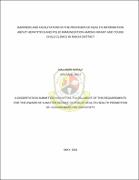| dc.description.abstract | This study aimed at examining the factors which hinder or facilitate the provision of health information
about Hepatitis B and Polio immunization among infant and young child clinics in Rakai District. In
order to learn about how health education is done, the researcher engaged with various categories of
participants including health workers and mothers/caregivers at different facilities and units at the
hospital. These included maternity ward, postnatal clinic and OPD. The guiding objectives were to
establish the knowledge levels of mothers/caregivers of infants on Hepatitis B and Polio immunization
in infants and young child clinics; to assess challenges in the provision of information on Hepatitis B
and Polio immunization to mothers/caregivers of infants in young child clinics and to examine the
enablers in the provision of knowledge on Hepatitis B and Polio immunization to mothers/caregivers of
infants and young children in infants and young child clinics in health facilities in Rakai District. The
research which was carried out in Rakai District employed descriptive cross-sectional research design
where both qualitative and quantitative methods were used to critically identify how health education for
Hepatitis B and polio immunization is facilitated or constrained. These are: proper planning processes
and effective utilization for available human, structural, time and material resources, communication
success in reaching and effective involvement of mothers in organizing Hepatitis B and polio health
education activities, sessions and dialogue so as to promote understanding and acceptance of messages.
However, the status and qualities of health workers including their communication skills both
intrapersonal and interpersonal characterized by using positions of authority that made
mothers/caregivers as only recipients of Hepatitis B and polio messages affected the delivery of health
information. During sampling, probability, purposive sampling and stratified sampling methods were
considered in choosing 147 nurses, 213 mothers/caregivers and 22 in-charges/Medicals Superintendent.
Data processing was done using SPSS Version 20.0, Cronbach’s alpha coefficient was computed and
proved the study was reliable with results above 0.70 on average for all variables.
Quite substantive knowledge was provided by health workers to mothers/caregivers aiming at changing
in attitude to create positive behavior and improved adherence to child immunization schedules for
Hepatitis B and polio. Enablers included participation of all health facilities in provision of
immunization services increased the chances of mothers to access immunization information on
Hepatitis B and Polio, private practitioners’ involvement, availability of tools, funding, and health
worker – mother/caregiver interaction, Hepatitis B and polio immunization outreaches. Among the key
barriers included limited number of health workers involved in facilitating and dissemination of
x
Hepatitis B and Polio immunization information whose interaction with mothers/caregivers is influenced
by power dynamics of a ‘teacher-student’ relationship thus this factor was responsible for low Hepatitis
B and polio immunization coverage which was reported to be staggering at only 33.3%.
Findings from this study provide highlights to the key messages about Hepatitis B and Polio
immunization that would be suitable to the mothers/caregivers in enhancing their knowledge and
influence positive behavior towards uptake of Hepatitis B and Polio immunization for their infants and
young children. The study also highlights interpersonal relations between health workers and
mothers/caregivers as being crucial in the provision of information about Hepatitis B and Polio
immunization and recommends that mothers be engaged in all processes of information provision about
Hepatitis B and Polio immunization to improve coverage. The study recommends that all stakeholders in
the process of immunization be more involved and made to appreciate the importance of and available
avenues for provision of information about Hepatitis B and Polio immunization as well as allocating
funds for conducting health education sessions and production of IEC materials for Hepatitis B and
Polio immunization | en_US |


